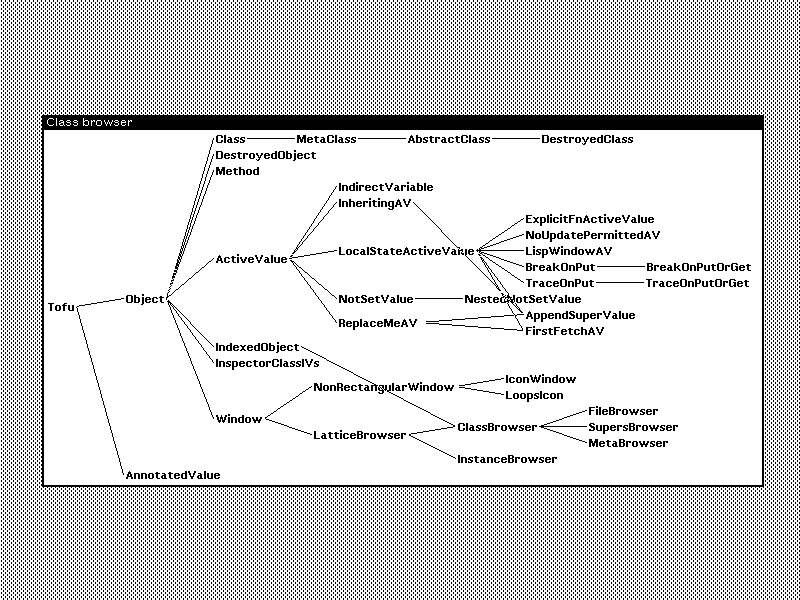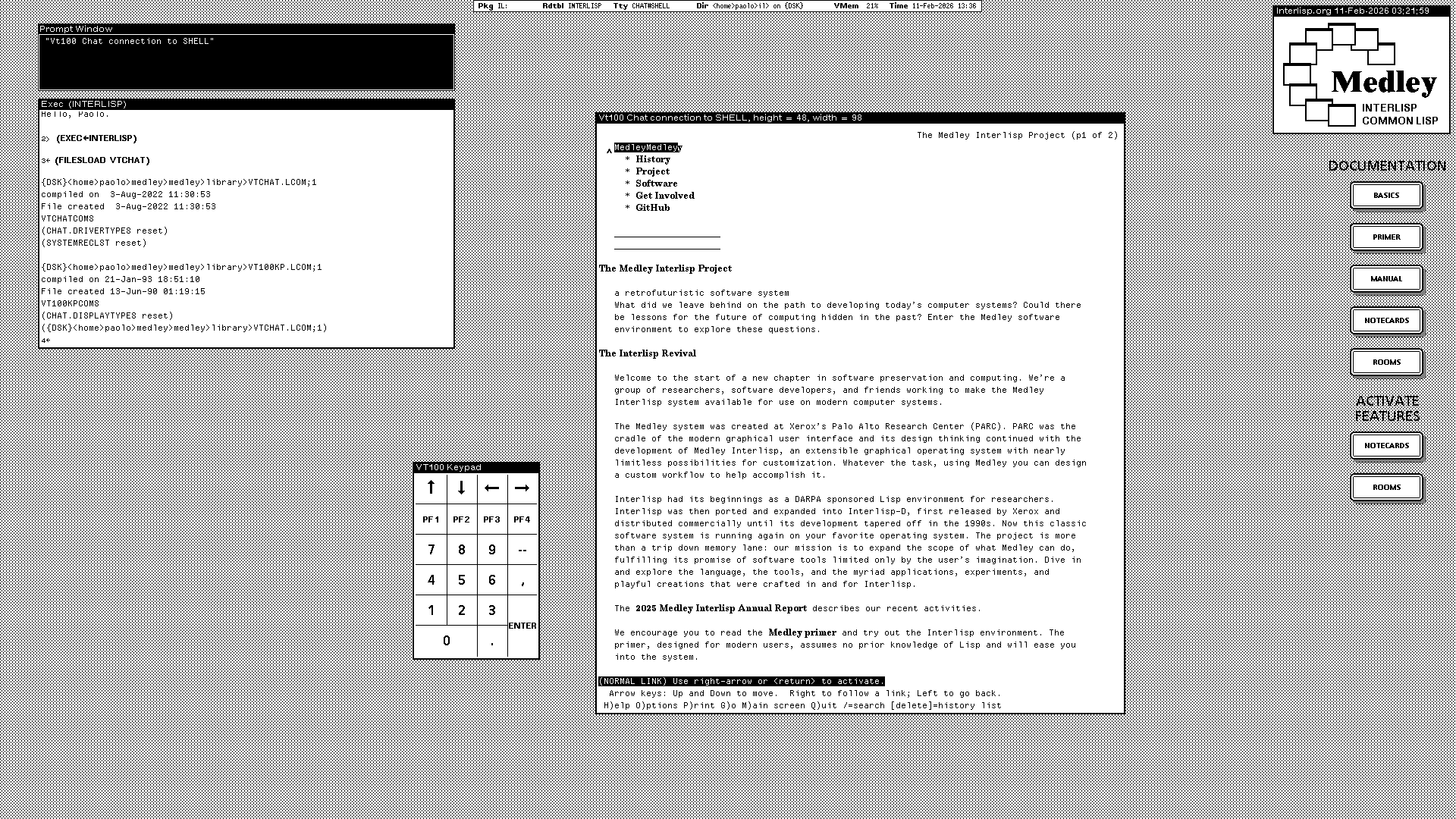The highest class of the LOOPS hierarchy is called Tofu, an acronym for "Top of the universe". The Lisp Object-Oriented Programming System (LOOPS) is the object extension of Interlisp.
The highest class of the LOOPS hierarchy is called Tofu, an acronym for "Top of the universe". The Lisp Object-Oriented Programming System (LOOPS) is the object extension of Interlisp.
Visiting interlisp.org with the Lynx web browser on Medley Interlisp. The main window is a VT100 terminal emulator running Lynx on the host operating system, Linux in this case. The smaller window next to the terminal is a VT100 keypad.
In this 1995 paper David Ungar discussed how to move the objects of a running Self program to another running image. He cited LOOPS, Interlisp's object-oriented extension, as a precursor close to the approach of Self.
https://dl.acm.org/doi/abs/10.1145/217839.217845
I'm studying the code of some system classes of LOOPS (Lisp Object-Oriented programming System), the OOP extension of Interlisp.
Here are some methods of class Window. The code is quite readable, with short and clean methods that most of the times make me understand what's going on.
I'm studying the code of some system classes of LOOPS (Lisp Object-Oriented programming System), the OOP extension of Interlisp.
Here are some methods of class Window. The code is quite readable, with short and clean methods that most of the times make me understand what's going on.
I like to study the screenshots of Interlisp applications in research papers to learn how the GUIs were put together, what APIs and tools they used, and how to code something similar.
The screenshots of the user interface of an expert system shell in this paper are especially clean and legible, which is unfortunately not often the case for old papers.
https://bitsavers.org/pdf/stanford/Stanford_CS_TR_Collection_2025-12-12/PDF/1985/CS-TR-85-1068.pdf
I worked on a couple of small but useful improvements to my Interlisp source file viewer: two new directory navigation commands.
https://journal.paoloamoroso.com/paoloamoroso/directory-commands-for-an-interlisp-file-viewer
I worked on a couple of small but useful improvements to my Interlisp source file viewer: two new directory navigation commands.
https://journal.paoloamoroso.com/paoloamoroso/directory-commands-for-an-interlisp-file-viewer
RE: https://fosstodon.org/@interlisp/115972122700808983
Why Medley Interlisp is called Medley.
Interlisp-D releases were named after words related to music starting with successive letters such as Carol, Fugue, Harmony, Intermezzo, Koto, and Lyric. Medley was the last before work on the system petered out in the 1990s.
RE: https://fosstodon.org/@interlisp/115938663174490825
Fifth Generation Computer Systems ➝ Quintus Prolog: get it?
In 1985 Xerox announced support for Prolog on its AI workstations and awarded development to Quintus, which delivered the Xerox Quintus Prolog implementation fully integrated with Interlisp-D.
http://www.bitsavers.org/pdf/xerox/interlisp-d/newsletters/AIDispatch_Aug85.pdf#page=9
https://softwarepreservation.computerhistory.org/prolog/#Quintus
RE: https://fosstodon.org/@interlisp/115921444786265154
We published the latest Medley Interlisp Annual Report. 2025 held symbolic (no pun intended) value for us as it was a round anniversary, the 5th year of the project.
RE: https://fosstodon.org/@interlisp/115921444786265154
We published the latest Medley Interlisp Annual Report. 2025 held symbolic (no pun intended) value for us as it was a round anniversary, the 5th year of the project.
We published the latest Medley Interlisp Annual Report, a summary of the work of 2025. Last year marked the fifth anniversary of the project and the report was an opportunity to reflect on what we achieved.
Using SBCL and McCLIM I wrote an Interlisp tool in modern Common Lisp with a CLIM GUI. That's what happens when one is having too much fun with Lisp.
https://journal.paoloamoroso.com/an-interlisp-file-viewer-in-common-lisp
Using SBCL and McCLIM I wrote an Interlisp tool in modern Common Lisp with a CLIM GUI. That's what happens when one is having too much fun with Lisp.
https://journal.paoloamoroso.com/an-interlisp-file-viewer-in-common-lisp
The 1984 Artificial Intelligence episode of the Computer Chronicles TV show, hosted by the late Stewart Cheifet, featured demonstrations of some Interlisp applications: the ONCOCIN expert system for medical consultation and the KEE Knowledge Engineering Environment expert system shell.
The 1984 Artificial Intelligence episode of the Computer Chronicles TV show, hosted by the late Stewart Cheifet, featured demonstrations of some Interlisp applications: the ONCOCIN expert system for medical consultation and the KEE Knowledge Engineering Environment expert system shell.


